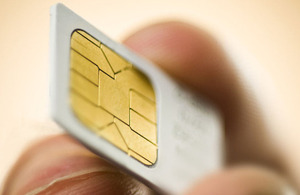Illicit prison phones to be cut off
Mobile phones that are being used by prisoners will be cut off under proposed new legislation.

Phone networks will be compelled to block mobile phones and SIM cards by the courts if they are being used in a prison, as part of the government’s proposed amendment to the Serious Crime Bill.
The amendment – discussed in Parliament on Monday – will be a powerful new tool in the fight against illicit mobile phone use in prisons.
Illicit mobile phones in prisons can lead to bullying and disorder, as well as being used by serious and organised criminals to continue their illegal activities, such as drug smuggling from behind bars.
Building on the recently introduced blocking technology and thorough searching processes that have already helped to increase seizures, the new legislation will take advantage of cutting-edge detection equipment that will allow prisons to identify unauthorised mobile phones and SIM cards being used within prisons.
Prisons Minister Andrew Selous said:
We will never tolerate the use of mobile phones in prisons and will continue to clamp down on their illicit use.
Our range of tough security measures has already successfully seen the number of seizures increase, but this proposed new legislation will significantly increase our ability to tackle this problem.
By ordering a phone to be cut off once it is identified, we will be able to reassure victims and prevent further criminal activity faster and wider than ever before.
The Ministry of Justice (MOJ) has worked closely with the Home Office to develop the amendment to the Serious Crime Bill. If approved, the legislation will mean that once a phone has been identified, the Prison Service will be able to apply to a court for it to be disconnected without needing to seize the phone or prove it is being used by a specific prisoner.
Prisons already use a comprehensive range of robust searching and security measures to detect items of contraband with intelligence-led searches, body searches, use of x-ray machines, metal detectors and CCTV surveillance cameras, as well as body orifice scanners all helping to tackle the use of mobile phones.
Building on existing legislation and the serious and organised crime strategy, the Serious Crime Bill will enhance the ability of law enforcement agencies to pursue, disrupt and bring to justice serious and organised criminals.
Notes to editors
-
The National Offender Management Service (NOMS) uses a range of measures to prevent unauthorised phones getting into prisons, as well as measures to identify and seize phones in the possession of prisoners. However, there are currently no legal obligations on mobile network operators to disconnect unauthorised phones in prisons. This proposed power is in part a response to a request by operators for a clear legal instrument to support disconnection.
-
The Offender Management Act 2007 made it a criminal offence to convey specific items, including mobile phones and associated equipment into or out of a prison or to transmit sounds or images from within a prison.
-
In March 2012, the Crime and Security Act 2010 also made it an offence, with a penalty of up to 2 years’ imprisonment and/or an unlimited fine, to possess an unauthorised mobile phone or other electronic equipment or component element that can receive or transmit information electronically within a prison.
-
The Prison (Interference with Wireless Technology) Act 2012 enabled the Secretary of State to authorise prison governors and directors to use blocking technology to detect and investigate the use of mobile phones in prison.
-
In 2013 a total of 7451 seizures were made of illicit mobile phones or SIM cards in prisons.